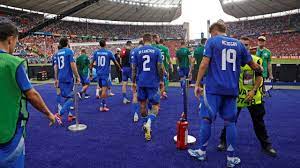Why Italy’s Euro fiasco is on Spalletti and why he must remain in charge

Rome: Luciano Spalletti has been confirmed as Italy’s head coach until the 2026 World Cup, but the Azzurri’s Euro exit came down to his decisions rather than the players’ supposed lack of talent, writes Lorenzo Bettoni.
Spalletti will remain in charge of the Azzurri until the 2026 World Cup, for which the Azzurri are clearly forced to qualify after missing out on two consecutive editions.
The CT and FIGC President Gabriele Gravina held a press conference on Sunday, the day after an awful 2-0 loss to Switzerland, to explain the elimination and the wrong decisions and to confirm that the Azzurri would not change their coach.
Despite some poor performances and a disappointing elimination in Germany, I believe that confirming Spalletti is the right decision.
The ex-Napoli boss has been in charge for less than a year and he had barely overseen 10 Azzurri matches before the Euros. Whoever thought that a coach like the Tuscan would have been able to turn things around in such a short period of time must have mistaken him for Harry Potter. Spalletti has no magic wand.
There are structural issues in Italian football, and we only just realized it today. Much more than just a coach will be needed to take Italian football back to the top, but as we already mentioned on Saturday, some progress has already been made by Serie A clubs, who surely can’t be blamed for Italy’s EURO fiasco.
This Italy side was not the most talented in the tournament and was vastly inexperienced, with 15 footballers who had never played at an international tournament before. At the same time, however, there were nine European champions from three years earlier, including Serie A winners Alessandro Bastoni and Nicolò Barella, who also played a Champions League Final with Inter only a year ago. Likewise Gianluca Scamacca won the Europa League with Atalanta in May while Federico Chiesa – despite his highs and lows at Juventus – is one of the most talented outfield players Italy has had in the last decade.
It’s fair to see Spalletti remain in charge, but at the same time, it’s impossible not to blame the CT for such a painful elimination.
It was all pretty confusing from the very beginning. The players Spalletti had called up included five centre-backs and five full-backs/wing-backs, clearly suggesting that the CT wanted to play with a three-man defence at the Euros. His plans obviously changed when Francesco Acerbi was forced to pull out due to a groin problem, but rather than using a suitable system for the players he had brought to Germany, he pursued a different avenue, switching to a four-man defence with attacking wingers despite having just three available.
The only time he started with three (in truth five) defenders was in the last group stage against Croatia.
Spalletti had no time, nor patience. In the second match against Spain, he confirmed the same line-up that had beat Albania on the debut. It was a mistake. After a game that saw the Azzurri produce 0 shots on target against La Roja, Spalletti admitted being wrong, saying that some footballers were tired and perhaps needed more rest.
But there is more. The Azzurri boss made two substitutions during the break in Gelsenkirchen against Spain, and from that moment, he would change his XI once every 45 minutes, making substitutions during the break also against Croatia and Switzerland. Surely, it didn’t help the players find their footing.
Another reason why the CT should be blamed is his persistence in starting Giovanni Di Lorenzo. It is understandable because he was his captain at Napoli in 2022-23 and Spalletti said that the Partenopei right-back was ‘like a son’ to him, suggesting that he would not have done without him in any game.
Di Lorenzo surely is Italy’s best option as a right-back in normal circumstances, and if Italy had gone through, nobody would have complained about him being deployed. However, when results do not come, the coach must take responsibility and acknowledge that his excessive trust in the player, hurt the team and didn’t benefit Di Lorenzo.
During his final Euro press conference, Spalletti admitted that he would learn lessons from this Euro campaign and that being a club coach is not like being a national team coach. He acknowledged that he’ll have to adapt and change as soon as possible. Italy desperately needs it because they can’t afford to miss out on their following and most important objective: qualifying for the 2026 World Cup.





